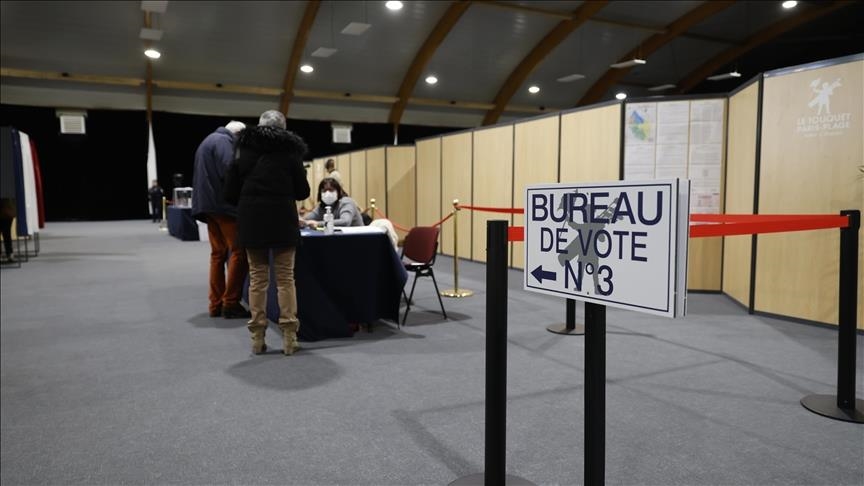France gears up for final Macron-Le Pen duel in presidential battle
PARIS
France is just days away from the finish line of a vitriolic presidential race.
Sunday’s runoff vote is a rematch of the 2017 contest that saw incumbent President Emmanuel Macron romping to victory over far-right challenger Marine Le Pen.
Macron, a centrist with pro-European views, is likely to do the double over Le Pen, who is firmly anti-immigration, a fervent follower of far-right ideas, and harbors deeply anti-Muslim views.

Of France’s 67 million people, some 48.7 million are registered to cast their ballots, and the latest polls indicate Macron will secure 57.5% of these votes in the second round, well ahead of Le Pen’s 42.5%.
He has the support of the other presidential hopefuls knocked out in the first round – center-right candidate Valerie Pecresse, the center-left Socialist Party’s Anne Hidalgo, and Yannick Jadot of the Greens.
Former Presidents Nicolas Sarkozy and Francois Hollande have also joined the growing chorus of prominent voices rallying people to back Macron and block Le Pen’s path to power.
A significant chunk – 42% – of people who voted for far-left candidate Jean-Luc Melenchon, who narrowly lost out to Le Pen in the first round, will back Macron in the runoff, latest surveys show.
Some 25% of these voters, though, are also leaning toward Le Pen.
For the National Rally leader, the most willing supporters for the second round have come from far-right contender Eric Zemmour’s base, with 72% of the controversial commentator’s voters set to back Le Pen.
Macron’s apparent edge over Le Pen was also reinforced in their televised debate this week – 59% of respondents in a poll found the 44-year-old to be the more convincing of the two.
Voting will begin at 8 a.m. local time (0600GMT) on Sunday and end at 8 p.m. (1800GMT).
Differing visions for France
As cost of living dominated the election, both candidates were quick to lay out their strategies to tackle the issue.
Macron has pledged to prioritize the economy, proposed measures such as hiking pensions to a minimum of €1,100 ($1,185), and vowed food assistance for millions.
Le Pen’s plans include abolishing income tax for people under the age of 30 and slashing value-added tax (VAT) on fuel from 20% to 5.5%.
She also wants to make jobs, social welfare and housing a “national priority” for French nationals, meaning they will be favored over foreign nationals living in the country.
Le Pen has said she will also cut other social benefits for foreign nationals and cancel residence permits of anyone who has not worked for a year.
According to a study by Institut Montaigne, a Paris-based think tank, Macron’s economic program will leave the country with a deficit of €44 billion, while Le Pen’s will push the figure above €100 billion.
On the environment, Macron wants to reduce greenhouse gas emissions and cut France’s reliance on coal and gas, vowing to build six new nuclear power plants.
Macron has said his new prime minister will be directly responsible for all environmental and climate-related issues.
Le Pen, on the other hand, has indicated she wants to abolish subsidies for renewable energy. She plans to dismantle existing wind turbines and stop building any new ones in France.
On immigration, Macron has admitted the need for tighter controls in France, saying that people who do not have the right to seek asylum and other foreigners who threaten public order should be deported.
Le Pen wants to hold a referendum on the issue and introduce stricter legislation. Apart from making entry tougher for foreigners, she wants to deport any foreigner who commits a serious crime or threatens public order.
Le Pen also plans to work on measures to revoke French citizenship, under certain conditions, of foreign-origin people born in the country.
France’s estimated 6 million Muslims have been a central point of discussion in this election.
Le Pen has left nothing to the imagination, making it clear that she will ban women from wearing the headscarf in public spaces and outlaw the ritual slaughter of animals.
She also plans to close down 570 mosques and block funding for more mosques that she says have links to “radical Islam” and “Salafist ideology.”
Macron has opposed her headscarf ban and deemed it unconstitutional. However, his government’s actions against and closure of hundreds of mosques, Islamic schools, shops, businesses and other Muslim-owned establishments cast doubt over Macron’s stance.
Le Pen and Macron also have sharply divergent views on France’s foreign relations, particularly with the European Union, NATO and Russia.
Le Pen, often criticized for her links to Russian President Vladimir Putin, has pushed for “strategic rapprochement” between NATO and Moscow, something she says is in the interest of France, Europe and the US.
She also wants to cut France’s involvement in NATO, including a withdrawal from the alliance’s military command.
Le Pen has also said that she sees French law as superior to the EU’s regulations, spurring accusations from Macron and others that she could pursue an exit from the bloc.
Anadolu Agency website contains only a portion of the news stories offered to subscribers in the AA News Broadcasting System (HAS), and in summarized form. Please contact us for subscription options.


